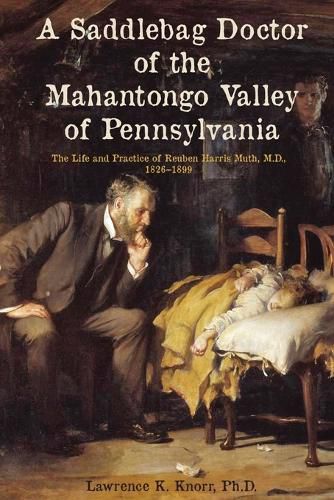Readings Newsletter
Become a Readings Member to make your shopping experience even easier.
Sign in or sign up for free!
You’re not far away from qualifying for FREE standard shipping within Australia
You’ve qualified for FREE standard shipping within Australia
The cart is loading…






This title is printed to order. This book may have been self-published. If so, we cannot guarantee the quality of the content. In the main most books will have gone through the editing process however some may not. We therefore suggest that you be aware of this before ordering this book. If in doubt check either the author or publisher’s details as we are unable to accept any returns unless they are faulty. Please contact us if you have any questions.
The life and medical practice of Reuben Harris Muth, M.D., a rural saddlebag doctor, is reconstructed from an extant set of physician's daybooks, chronicling his professional activity from 1858 until 1898, including patients seen and the fees charged. The daybooks also provided a modicum of hints at other activities in his life, including his farming business and the whereabouts of his wayward son. However, there were no personal letters or diaries available. Thus, other primary sources and local newspaper accounts were utilized to fill out the most likely details and actions of his life, approximating his movements, key decisions, and personal interactions. Secondary sources provided additional details about Dr. Muth and the people with whom he interacted. What results is a plausible "theory of his life" based on mostly circumstantial but corroborating evidence. Medical and economic historians will be most interested in the collected and transcribed quantitative data of the rural doctor's practice, providing a longitudinal study of a 19th-century medical career experienced in the Pennsylvania Dutch region. Data collected includes a complete record of fees charged, detailed to the date and patient, including all births handled by the doctor. Summations of this data provide trends regarding the arc of the doctor's career against economic trends of the times and the performance of his closest peers. What results from this foundational, cross-discipline research is a rare glimpse of early medical history from an economic and cultural perspective.
$9.00 standard shipping within Australia
FREE standard shipping within Australia for orders over $100.00
Express & International shipping calculated at checkout
Stock availability can be subject to change without notice. We recommend calling the shop or contacting our online team to check availability of low stock items. Please see our Shopping Online page for more details.
This title is printed to order. This book may have been self-published. If so, we cannot guarantee the quality of the content. In the main most books will have gone through the editing process however some may not. We therefore suggest that you be aware of this before ordering this book. If in doubt check either the author or publisher’s details as we are unable to accept any returns unless they are faulty. Please contact us if you have any questions.
The life and medical practice of Reuben Harris Muth, M.D., a rural saddlebag doctor, is reconstructed from an extant set of physician's daybooks, chronicling his professional activity from 1858 until 1898, including patients seen and the fees charged. The daybooks also provided a modicum of hints at other activities in his life, including his farming business and the whereabouts of his wayward son. However, there were no personal letters or diaries available. Thus, other primary sources and local newspaper accounts were utilized to fill out the most likely details and actions of his life, approximating his movements, key decisions, and personal interactions. Secondary sources provided additional details about Dr. Muth and the people with whom he interacted. What results is a plausible "theory of his life" based on mostly circumstantial but corroborating evidence. Medical and economic historians will be most interested in the collected and transcribed quantitative data of the rural doctor's practice, providing a longitudinal study of a 19th-century medical career experienced in the Pennsylvania Dutch region. Data collected includes a complete record of fees charged, detailed to the date and patient, including all births handled by the doctor. Summations of this data provide trends regarding the arc of the doctor's career against economic trends of the times and the performance of his closest peers. What results from this foundational, cross-discipline research is a rare glimpse of early medical history from an economic and cultural perspective.